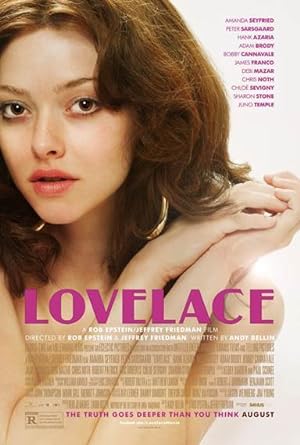Lovelace is a drama that focuses on the story behind Deep Throat with a specific focus on the titular persona and the woman behind it. Lovelace stars Amanda Seyfried, who plays Linda, and Peter Sarsgaard, who plays Chuck. While the movie captures the visual aesthetic of the 1970s perfectly, including shooting in the cinematography style of that era, it is awkwardly torn in its depiction of the events between how it felt to be a consumer of the product and how it feels with the benefit of hindsight. The tone of the film veers wildly from broad comedy and joy at sexual prowess to a bleak Lifetime biopic of an abused woman with an unfortunate repetitive choice to show events from both perspectives instead of blending the story into a cohesive whole.
Lovelace is still a movie worthy of your time. The cast is outstanding except for James Franco whose inability to disappear behind his character may be the reason that people enjoy casting him, but it is a huge mistake if you are playing a well known person like Hugh Hefner. Sharon Stone is literally unrecognizable as the severe, domineering mother. Robert Patrick deserved more screen time, especially since Linda’s father is such a contrast to her mother and the other men in her life. Patrick paints a portrait of a man more understanding of human frailties yet his home is not a sanctuary perhaps because he extended that tolerance to his wife’s behavior coupled with her past so he let her create an inhospitable environment.
Juno Temple scares me. Her performances are unpredictable, and I never trust her characters. Her characters rarely do anything irredeemably evil, but she has an off kilter approach that makes me suspect that they are capable of anything so when her character in Lovelace, a sexually savvy friend, actually warns Linda to stay away from Chuck after initially encouraging their relationship, it shocked me. Temple’s performance showed me how the entire movie missed a great opportunity to strengthen the narrative.
By the middle of the film, Lovelace reveals that Chuck is actually grooming and exploiting Linda, which was obvious to me and Temple’s character fairly early in the film. I think Temple’s character should have had a larger role and shown Chuck making a deliberate decision to choose Linda over her to reflect that one is more vulnerable to predators. Lovelace circles around the idea that when normal sexual behavior is punished, and women are brought up in a restrictive culture, it makes them more vulnerable to sexual exploitation since they cannot make a distinction between healthy sexual boundaries and abuse. Temple’s character immediately knows the difference between a sexual liberator and a pimp, but neither Linda nor her family know the difference between a man worthy of deference to his experience and judgment versus manipulation because in their world, all men deserve respect and deference, and all women need to be handled.
Chuck makes himself the good guy in front of Linda’s family, but takes actions that further isolate her from them by keeping her out late and not caring about the consequences because it will make the family happy to give him control over her. He then uses the oldest trick in the book, reverse psychology and negging, to push her sexual boundaries and get her to do what he wants. He merges their identities by making her feel that if he has a problem, it is actually her problem that she needs to solve. He uses anger and the threat of physical violence to get her to anticipate what he wants and accommodate him before he actually asks her to do something so there is less resistance when he finally does. The most frightening aspect of his behavior is when she excels at doing what he wants, which benefits him, and he punishes her for feeling good about it because he can sense that she is forming a separate, independent identity. It is simultaneously self-sabotage and self-preservation, which shows that exploitation is ultimately not sustainable for the abuser or the target of abuse. It was the most horrific moment in the film.
Lovelace also does a great job of showing how everyone except Temple’s character acts as unofficial enforcers of abuse: the Catholic Church, the police, her parents and her coworkers. I think that the movie ultimately pulls punches about the porn industry because the filmmakers would like to believe that Linda’s story is not emblematic, but an aberration. I have no idea if it is or not, but I think that the idea that something that you enjoy can also be inherently and objectively a product of exploitation terrifies them so they don’t explore it. Lovelace has all the elements of a great historical biopic, but falls short because of the filmmakers’ psychological conflict over the subject matter.
Stay In The Know
Join my mailing list to get updates about recent reviews, upcoming speaking engagements, and film news.





